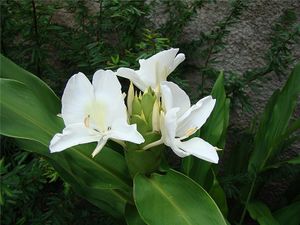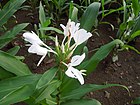Note: This is a project under development. The articles on this wiki are just being initiated and broadly incomplete. You can Help creating new pages.
Hedychium coronarium - Butterfly ginger lily
Hedychium coronarium is the National Flower of Cuba, where it is known as mariposa due to its shape. The plant has become wild in the cool rainy mountains in Sierra del Rosario, Pinar del Rio Province in the west, Escambray Mountains in the center of the island, and in Sierra Maestra in the very west of it.
Contents
- 1 Uses
- 2 Parts Used
- 3 Chemical Composition
- 4 Common names
- 5 Properties
- 6 Habit
- 7 Identification
- 8 List of Ayurvedic medicine in which the herb is used
- 9 Where to get the saplings
- 10 Mode of Propagation
- 11 How to plant/cultivate
- 12 Commonly seen growing in areas
- 13 Photo Gallery
- 14 References
- 15 External Links
Uses
Febrifuge, Chest pain, Tonsillitis, Infected nostrils, Abdominal complaint, Stiff joints, Pain in arms
Parts Used
Chemical Composition
Three new labdane-type diterpenes 1-3, named coronarins G-I as well as seven known 4-10, coronarin D, coronarin D methyl ether, hedyforrestin C, (E)-nerolidol, β-sitosterol, daucosterol, and stigmasterol were isolated[1]
Common names
| Language | Common name |
|---|---|
| Kannada | Suruli Sugandhi |
| Hindi | Dolan champa |
| Malayalam | Elipoochedihankitam, Chantikantam |
| Tamil | Chankitam, Chantikantam |
| Telugu | Kichchiligadda |
| Marathi | NA |
| Gujarathi | NA |
| Punjabi | NA |
| Kashmiri | NA |
| Sanskrit | |
| English | Butterfly Ginger Lily |
Properties
Reference: Dravya - Substance, Rasa - Taste, Guna - Qualities, Veerya - Potency, Vipaka - Post-digesion effect, Karma - Pharmacological activity, Prabhava - Therepeutics.
Dravya
Rasa
Tikta (Bitter), Kashaya (Astringent)
Guna
Laghu (Light), Tikshna (Sharp)
Veerya
Ushna (Hot)
Vipaka
Katu (Pungent)
Karma
Vata
Prabhava
Habit
Identification
Leaf
| Kind | Shape | Feature |
|---|---|---|
| sharp-pointed | lance-shaped | 8-24 in long and 2-5 in wide and arranged in 2 neat ranks that run the length of the stem |
Flower
| Type | Size | Color and composition | Stamen | More information |
|---|---|---|---|---|
| Unisexual | 6-12 in long | white | 5 | flowers are like Showy, Fragrant |
Fruit
| Type | Size | Mass | Appearance | Seeds | More information |
|---|---|---|---|---|---|
| 7–10 mm (0.28–0.4 in.) long pome | clearly grooved lengthwise, Lowest hooked hairs aligned towards crown | With hooked hairs | {{{6}}} |
Other features
List of Ayurvedic medicine in which the herb is used
- Vishatinduka Taila as root juice extract
Where to get the saplings
Mode of Propagation
How to plant/cultivate
Plants are not very hardy, they tolerate temperatures down to about -2°c[3]
Commonly seen growing in areas
Tropical area, Subtropical area, Moist places along streams, Forest edges, Along the banks of river.
Photo Gallery
References
External Links
- Ayurvedic Herbs known to be helpful to treat Febrifuge
- Ayurvedic Herbs known to be helpful to treat Chest pain
- Ayurvedic Herbs known to be helpful to treat Tonsillitis
- Ayurvedic Herbs known to be helpful to treat Infected nostrils
- Ayurvedic Herbs known to be helpful to treat Abdominal complaint
- Ayurvedic Herbs known to be helpful to treat Stiff joints
- Ayurvedic Herbs known to be helpful to treat Pain in arms
- Herbs with Young buds used in medicine
- Herbs with Flowers used in medicine
- Herbs with Roots used in medicine
- Herbs with common name in Kannada
- Herbs with common name in Hindi
- Herbs with common name in Malayalam
- Herbs with common name in Tamil
- Herbs with common name in Telugu
- Herbs with common name in English
- Habit - Perennial herb
- Index of Plants which can be propagated by Seeds
- Index of Plants which can be propagated by By clump
- Herbs that are commonly seen in the region of Tropical area
- Herbs that are commonly seen in the region of Subtropical area
- Herbs that are commonly seen in the region of Moist places along streams
- Herbs that are commonly seen in the region of Forest edges
- Herbs that are commonly seen in the region of Along the banks of river
- Herbs
- Ayurvedic herbs that don't have seed photos






